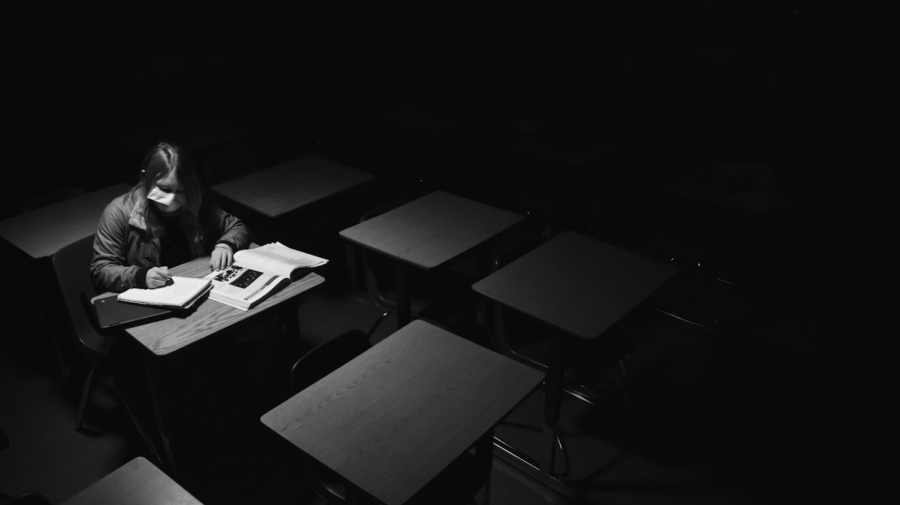School Has Inherent Value In Being A Place to Go
February 4, 2021
As the COVID 19 pandemic swept across the nation and caused thousands of schools to shut their doors to traditional in-person learning, both personal and widespread tribulations resulted. Parents had no one to care for their children while at work, leading many to drop out of the workforce (4 times as many women as men, according to a recent NPR article). As gender disparities worsened and unemployment rates grew, children likewise suffered. Kids with learning disabilities struggled during online teaching. Those that depended on school for one or multiple daily meals went without reliable food. In some cases kids’ mental health deteriorated, and in many others kids were simply bored or lonely.
Such detrimental impacts of children having to stay home over an extended period of time revealed the education system’s most inherently valuable service: daycare. For kids ages four to eighteen, parents depend on a consistent and low-cost location for their children to exist and be kept out of trouble. Education could be considered the icing on the cake! While learning the ins and outs of the world is a necessity, studying is second priority to keeping kids alive during the workday. Only with this essential service that school provides can the economy, and thus society, continue to function.
School being a place where kids can go is often an undervalued element of education, as we can see by the number of schools that remain online due to the coronavirus. Even as vaccines are rolled out, school buildings that have not held classes since March, 2020 are having difficulty welcoming students back now. According to a recent NPR article on school reopening conflicts, several school districts such as those in Chicago and Washington D.C. are facing teacher strikes and public division over planning on returning to in-person instruction. Even as many of the students such school systems serve fall behind on learning, teachers’ unions and parental concerns make reopening schools a stricken matter. As is unfortunately often the case, low-income families and children in poverty are hurt the most by in-person school being delayed. Students who don’t have a parent to help them with their schoolwork don’t progress at the same rate as students that do. Numerous school districts across the country are reporting plummeting learning retention and test scores as a result of online school, and the worst learning loss is for students who already needed the most help.
The teachers unions and parents delaying the reopening of schools in their districts fail to recognize how much some students need a place to exist outside of their house. Online school has not been working for many families who require the daycare element in-person instruction offers, but their needs are going unmet because the families who can manage to keep their kids home are hindering the process. While children are unlikely to have severe reactions to a COVID infection and little spread has been found to occur in the schools that have opened across the country, it is inevitable that children will fall behind in learning and socialization if they continue to be kept at home.
Without a place to go, without a place to meet friends, work with others, and get away from screens, childhood becomes a very different experience. Losing your 38th year to Netflix and Zoom is not an equal loss to losing your one chance to be 13. While kids can feel that school is tedious and even ridiculous at times, you never know when you might meet your new best friend during a class or sports practice.
Teachers also miss out when they can’t see students in-person. Shauna Miller, who teaches classes such as AP Literature and Creative Writing at FMHS, stated, “I missed students during online school. I miss the interaction and making a difference in people’s lives.” Though you may doubt it at times, many teachers actually like kids and like connecting with students. Over the screen that connection and class engagement is lost.
Upon reflection, I believe that students in School District 51 should be grateful our schools opened back up in August. There’s only so much time we can spend working from our beds and texting before we need to get out of the house and actually talk to a real human being.
School is not exclusively about learning, after all. It is about hanging out with your peers, making new friends, and getting in trouble for not knowing how to stand in a line. (Speaking of, all of these kids at home are going to forget how to stand in lines! That’ll be a chore for their teachers when they return to classrooms…) It is about listening to teachers talk about their trip to India when they should be talking about long division. It is about playing volleyball even though you’re terrible at volleyball but so is everyone else. It is about the librarian teaching you how to do magic tricks before you go to recess. It is about learning how to wake up early and get dressed. So much of school is about having a place to go.
